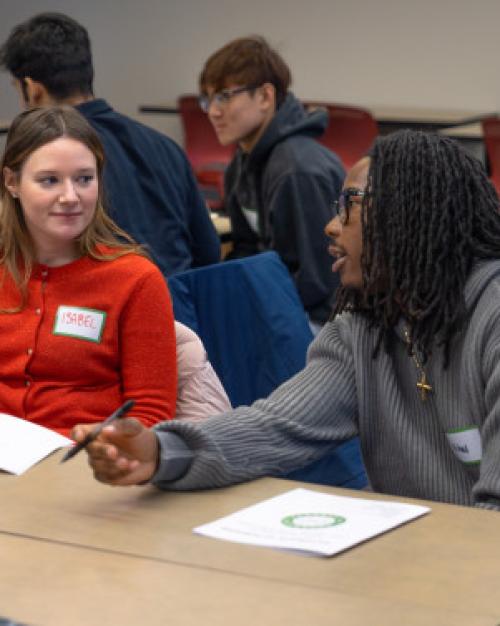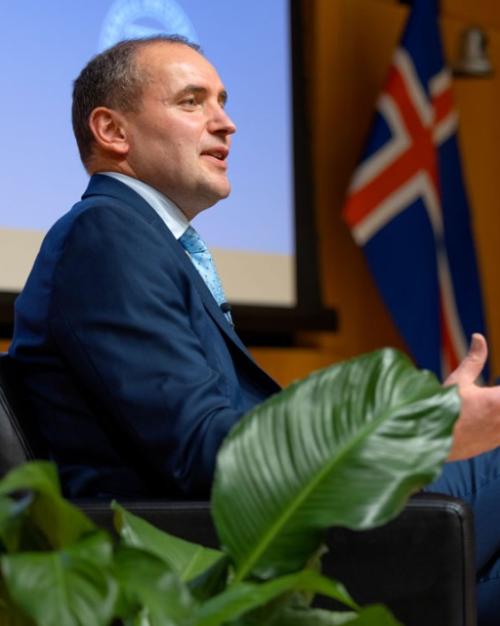Guðni Th. Jóhannesson, president of Iceland, discussed his country’s commitment to peace, diversity and science-based climate solutions during a sold-out lecture held Nov. 10 in Klarman Hall and live streamed to an audience of hundreds.
“We see the effects of climate change before our eyes,” Jóhannesson said. “Human action has made this change more extreme. It is the will of the majority of people in Iceland to take part in doing what we can to mitigate the effects that humankind has had on nature.”
The talk was a highlight of a two-day visit to Cornell in which Jóhannesson met with university leaders and Icelandic students and toured some of the university’s key sustainability initiatives, as well as the College of Veterinary Medicine’s Icelandic horse barn and Cornell University Library’s Icelandic rare book collection.
Jóhannesson, a former academic who has served as president since 2016, began the lecture with a story about making international news for saying he disliked pineapple on pizza. “Everything is political, even pizza,” he said. His story set the scene for a discussion about how small states can influence international events: “When you’re small, you can turn your smallness into strength.”
The hourlong lecture, “Can Small States Make a Difference? The Case of Iceland on the International Scene,” was part of the Mario Einaudi Center for International Studies’ work on democratic threats and resilience. The event was moderated by Peter Katzenstein, the Einaudi Center’s Walter S. Carpenter Jr. Professor of International Studies and professor of government in the College of Arts and Sciences (A&S).
“President Jóhannesson’s talk explores how the peace-loving nation of Iceland works globally for a democratic, secure and sustainable future. It’s a theme that resonates here at Cornell University,” said Einaudi Center director Rachel Beatty Riedl in her opening remarks. Riedl is Einaudi’s John S. Knight Professor of International Studies in A&S and the Cornell Jeb E. Brooks School of Public Policy.
One of Iceland’s most significant global contributions is its commitment to climate solutions such as geothermal energy, Jóhannesson said. He described the benefits of modeling systems for renewable energy for other parts of the world, including Cornell, as it makes plans to use Earth Source Heat to warm the Ithaca campus.
According to the Institute for Economics and Peace’s Global Peace Index, Iceland is the world’s most peaceful nation. It’s also a founding member of North Atlantic Treaty Organization (NATO) and a global leader in democracy and human rights. In his talk, Jóhannesson redefined nationalism as a way to welcome diversity.
“Nationalism is a strong force in all societies,” he said, “but our definition of nationalism – if we are going to be able to defend it and promote it – has to be inclusive and tolerant and understanding.”
The lecture concluded with a Q&A led by Katzenstein, with questions from students exploring differences between the United States and Iceland on issues including gun control, green energy and peace.
One student asked what advice a small country like Iceland would give the U.S. about how democracy should be practiced.
“Democracy is at its best, I believe, when there is no rupture in the communication between the voter and the elected person,” Jóhannesson said. “This can sometimes be easier in a small community. Maybe what we benefit from back home is the fact that people feel like every vote matters. Having witnessed the results of the latest election here in the U.S., I think it’s a strong lesson for the fact that every vote counts.”
The full presentation can be viewed on Cornell Video.
Megan DeMint is a communications specialist for Global Cornell.





